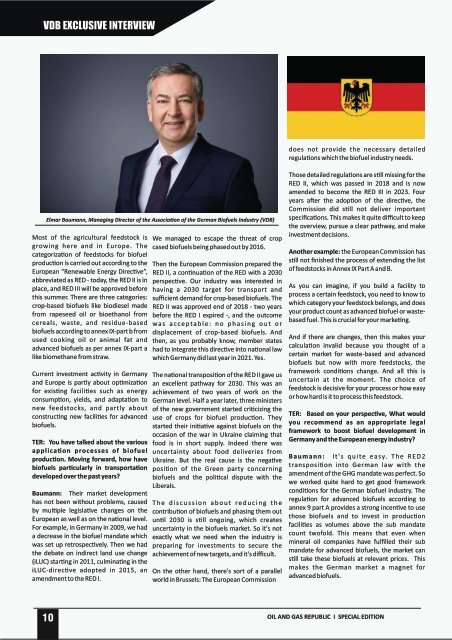The Energy Republic February - March Edition 2023
A special publication focused on the Sub-Saharan Africa oil and gas industry with industry updates about the project and investment opportunities in the continent. In this edition, we also featured interesting stories about the energy sector as well as the role of bioenergy resources in the global energy transition agenda, with a spotlight on Germany's biofuel industry, coupled with stakeholders' commentaries and an exclusive interview with Elmar Baumann, Managing Director of the Association of the German Biofuel Industry (VDB).
A special publication focused on the Sub-Saharan Africa oil and gas industry with industry updates about the project and investment opportunities in the continent.
In this edition, we also featured interesting stories about the energy sector as well as the role of bioenergy resources in the global energy transition agenda, with a spotlight on Germany's biofuel industry, coupled with stakeholders' commentaries and an exclusive interview with Elmar Baumann, Managing Director of the Association of the German Biofuel Industry (VDB).
You also want an ePaper? Increase the reach of your titles
YUMPU automatically turns print PDFs into web optimized ePapers that Google loves.
VDB EXCLUSIVE INTERVIEW<br />
does not provide the necessary detailed<br />
regula ons which the biofuel industry needs.<br />
Elmar Baumann, Managing Director of the Associa on of the German Biofuels Industry (VDB)<br />
Most of the agricultural feedstock is<br />
growing here and in Europe. <strong>The</strong><br />
categoriza on of feedstocks for biofuel<br />
produc on is carried out according to the<br />
European “Renewable <strong>Energy</strong> Direc ve”,<br />
abbreviated as RED - today, the RED II is in<br />
place, and RED III will be approved before<br />
this summer. <strong>The</strong>re are three categories:<br />
crop-based biofuels like biodiesel made<br />
from rapeseed oil or bioethanol from<br />
cereals, waste, and residue-based<br />
biofuels according to annex IX-part b from<br />
used cooking oil or animal fat and<br />
advanced biofuels as per annex IX-part a<br />
like biomethane from straw.<br />
Current investment ac vity in Germany<br />
and Europe is partly about op miza on<br />
for exis ng facili es such as energy<br />
consump on, yields, and adapta on to<br />
new feedstocks, and partly about<br />
construc ng new facili es for advanced<br />
biofuels.<br />
TER: You have talked about the various<br />
applica on processes of biofuel<br />
produc on. Moving forward, how have<br />
biofuels par cularly in transporta on<br />
developed over the past years?<br />
Baumann: <strong>The</strong>ir market development<br />
has not been without problems, caused<br />
by mul ple legisla ve changes on the<br />
European as well as on the na onal level.<br />
For example, in Germany in 2009, we had<br />
a decrease in the biofuel mandate which<br />
was set up retrospec vely. <strong>The</strong>n we had<br />
the debate on indirect land use change<br />
(iLUC) star ng in 2011, culmina ng in the<br />
iLUC-direc ve adopted in 2015, an<br />
amendment to the RED I.<br />
We managed to escape the threat of crop<br />
cased biofuels being phased out by 2016.<br />
<strong>The</strong>n the European Commission prepared the<br />
RED II, a con nua on of the RED with a 2030<br />
perspec ve. Our industry was interested in<br />
having a 2030 target for transport and<br />
sufficient demand for crop-based biofuels. <strong>The</strong><br />
RED II was approved end of 2018 - two years<br />
before the RED I expired -, and the outcome<br />
w a s a c c e p t a b l e : n o p h a s i n g o u t o r<br />
displacement of crop-based biofuels. And<br />
then, as you probably know, member states<br />
had to integrate this direc ve into na onal law<br />
which Germany did last year in 2021. Yes.<br />
<strong>The</strong> na onal transposi on of the RED II gave us<br />
an excellent pathway for 2030. This was an<br />
achievement of two years of work on the<br />
German level. Half a year later, three ministers<br />
of the new government started cri cizing the<br />
use of crops for biofuel produc on. <strong>The</strong>y<br />
started their ini a ve against biofuels on the<br />
occasion of the war in Ukraine claiming that<br />
food is in short supply. Indeed there was<br />
uncertainty about food deliveries from<br />
Ukraine. But the real cause is the nega ve<br />
posi on of the Green party concerning<br />
biofuels and the poli cal dispute with the<br />
Liberals.<br />
T h e d i s c u s s i o n a b o u t r e d u c i n g t h e<br />
contribu on of biofuels and phasing them out<br />
un l 2030 is s ll ongoing, which creates<br />
uncertainty in the biofuels market. So it's not<br />
exactly what we need when the industry is<br />
preparing for investments to secure the<br />
achievement of new targets, and it's difficult.<br />
On the other hand, there's sort of a parallel<br />
world in Brussels: <strong>The</strong> European Commission<br />
Those detailed regula ons are s ll missing for the<br />
RED II, which was passed in 2018 and is now<br />
amended to become the RED III in <strong>2023</strong>. Four<br />
years a er the adop on of the direc ve, the<br />
Commission did s ll not deliver important<br />
specifica ons. This makes it quite difficult to keep<br />
the overview, pursue a clear pathway, and make<br />
investment decisions.<br />
Another example: the European Commission has<br />
s ll not finished the process of extending the list<br />
of feedstocks in Annex IX Part A and B.<br />
As you can imagine, if you build a facility to<br />
process a certain feedstock, you need to know to<br />
which category your feedstock belongs, and does<br />
your product count as advanced biofuel or wastebased<br />
fuel. This is crucial for your marke ng.<br />
And if there are changes, then this makes your<br />
calcula on invalid because you thought of a<br />
certain market for waste-based and advanced<br />
biofuels but now with more feedstocks, the<br />
framework condi ons change. And all this is<br />
uncertain at the moment. <strong>The</strong> choice of<br />
feedstock is decisive for your process or how easy<br />
or how hard is it to process this feedstock.<br />
TER: Based on your perspec ve, What would<br />
you recommend as an appropriate legal<br />
framework to boost biofuel development in<br />
Germany and the European energy industry?<br />
B a u m a n n : I t ' s q u i te e a sy. T h e R E D 2<br />
transposi on into German law with the<br />
amendment of the GHG mandate was perfect. So<br />
we worked quite hard to get good framework<br />
condi ons for the German biofuel industry. <strong>The</strong><br />
regula on for advanced biofuels according to<br />
annex 9 part A provides a strong incen ve to use<br />
those biofuels and to invest in produc on<br />
facili es as volumes above the sub mandate<br />
count twofold. This means that even when<br />
mineral oil companies have fulfilled their sub<br />
mandate for advanced biofuels, the market can<br />
s ll take these biofuels at relevant prices. This<br />
makes the German market a magnet for<br />
advanced biofuels.<br />
10<br />
OIL AND GAS REPUBLIC I SPECIAL EDITION















